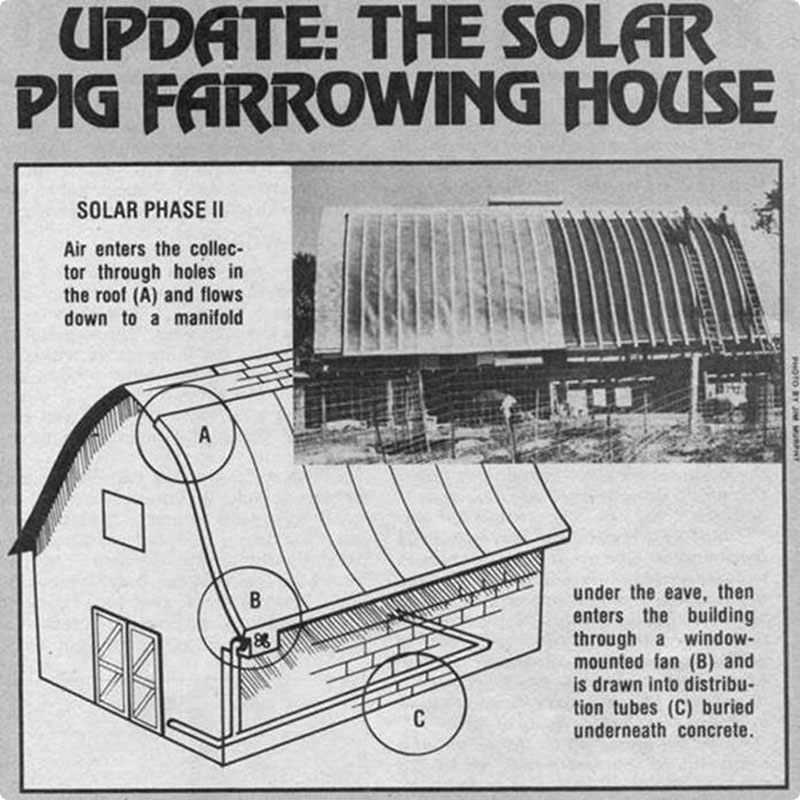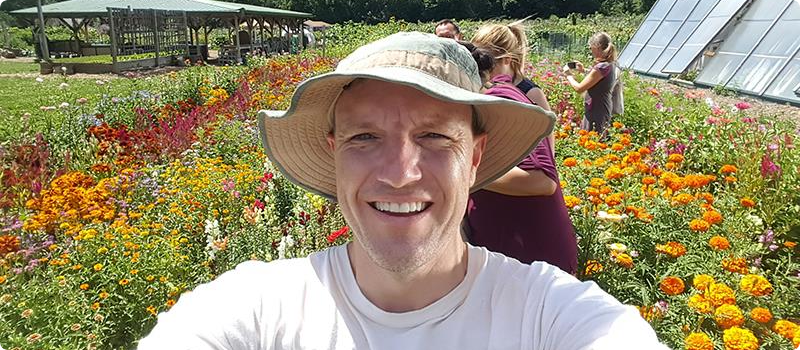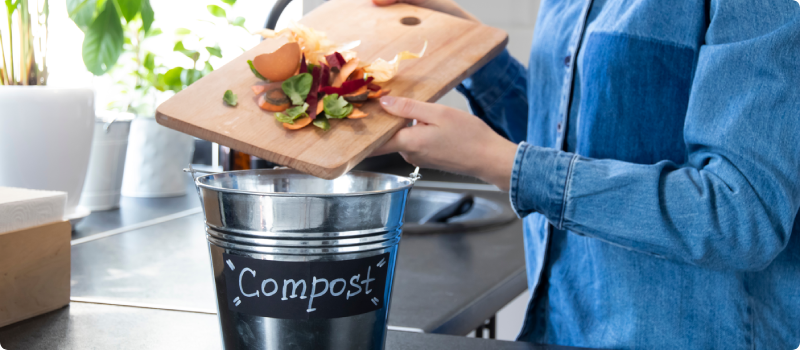Permaculture, pigs and panels: developing a sustainability mindset
Updated April 16, 2020 . AmFam Team
While American Family Insurance does our part to minimize operational impact through our sustainability efforts, it’s employees like Social Media Administrator Josh Feyen who we admire and applaud for committing to living a sustainable life. Josh doesn’t just talk the talk — his dedication to sustainability is deep-rooted, starting in his childhood and blossoming throughout adulthood in his personal and professional life. Through his story, Josh hopes to educate and encourage others that, no matter how big or small, your effort matters.
In 1976, Josh’s parents moved his family of five from a comfortable, middle-class life in suburban Milwaukee to a farm in southwest Wisconsin.
“Our economic outlook took an immediate nose dive, but our opportunities to learn soared,” says Josh. By 1979, his dad's hog operation was well underway, his mom had established a full-scale produce garden and he and brothers could heave hay bales that weighed more than each of them.
Josh’s dad also found some spare time and energy to apply his mechanical skills to inventing new ways to heat their mama pigs and piglets in the dead of winter. Recalling the pain of the 1973 oil crisis and the ongoing energy crisis in 1979, the federal government was also exploring alternative heating systems.
In 1979, the Department of Energy funded Josh’s dad's idea to install solar hot-air collectors on their barn to keep the pigs warm and to dry the corn harvest. The system was such a success that his dad installed similar systems on the garage and house.
“This meant I saw ‘sustainability’ — a word none of us were using at the time — in practice firsthand,” says Josh.

There were other people in Josh’s community experimenting with ways to conserve and collect energy. Several families in their circle of friends installed massive "Russian stoves," huge masonry chimneys built from basement to attic that only needed to be wood-fired once a day.
Another family built a large aquaculture pond in a greenhouse attached to their home. It captured solar energy for nighttime heating and let them have fresh fish year-round. And there were windmills, a return to horse-drawn farming implements and experiments in communal living to reduce the number of square feet individuals needed.
Some of these efforts succeeded. Others never quite worked, but all were done with the goal of caring for the earth and its people and not using more than what was needed to thrive.
Josh points out, “If you're following along and connecting the dots, you'd be right to assume I lived among a large ‘hippie’ community that today I call family, and from whom I learned much by way of observation and practice.”

Fast forward to 2013, and Josh found himself encountering the word "permaculture" at every turn. He attended his first Wisconsin Garden Expo where he met members of the Madison Area Permaculture Guild. In adulthood, when visiting families he grew up with, Josh learned that they considered themselves permaculture practitioners, though they hadn't applied the label when he was younger.
When Josh told another friend he was considering planting an orchard in the front yard of his newly purchased home, his friend asked if he was going to use permaculture design principles. Josh asked himself, “What is this permaculture thing people keep talking about?”
Permaculture is a word combining "permanent" and "agriculture." It describes food-producing ecosystems designed to be sustainable and self-sufficient. These ecosystems can range in size from a front-yard orchard with fruit bushes growing in the dappled shade of dwarf fruit trees, to a large-scale food forest with pigs grazing on fallen fruit or nuts. He became smitten with the ideas and signed up for a course that met one Saturday a month for 10 months.
Those Saturdays of networking, touring installations and doing a lot of reading provided him with many “ah-ha” moments. They also offered an entirely new perspective of what was important to Josh and pointed his personal, academic and professional life in a new direction. That direction can be summarized through the three permaculture tenets:
- Care for the earth: Provide for all life systems so they can continue and multiply.
- Care for the people: Provide for people so they have access to the resources necessary for their existence.
- Fair share: Take no more than what you need before you reinvest the surplus.
Hungry for more, Josh sought out a graduate program that embraced similar principles and found that Madison's own Edgewood College offered a Sustainability Leadership master's program. He started in 2016, took his time and graduated in May 2019.
“In addition to higher education, we’ve done a lot at home to reduce energy needs and make more efficient use of our urban land and house,” Josh says.

Josh and his husband installed thermal blinds in all their windows. Then they hired a company to conduct an energy audit, sealed and insulated the house, and halved the airflow through their home. They also installed a Sense electricity meter and Nest thermostat to help them learn about and reduce their energy needs. Once they understood their new (lower) energy requirements, they installed solar panels and bought an electric vehicle. “My husband and I live in a large house, way more than two people and three cats need, and despite all these improvements, it bothered me that we were heating empty rooms that weren’t being used. So we invited a friend, and then a second person, to live with us and share our home,” Josh says.
In the meantime, while he works in Marketing helping agents use social media to market their businesses, he’s also involved with two sustainability projects at American Family. His personal interest in American Family's electric-vehicle charging program led him to administer it for more than a year. And, when the American Family sustainability team began a “corporate responsibility and the field” project, Josh volunteered to be on the team, adding his experience working with agents and his sustainability graduate work.
Josh says, “When I look back on my life so far and think about my life yet to come, I ask myself, ‘What’s the point of doing all this when the ice caps are melting, the ocean is full of plastic and massive human migrations are already happening due to climate change?’”

His solace is that there are countless other smaller, quieter but just as potent moments. These moments are when actual change happens, and when added together, they add up to changes toward a better world. Want to start taking some small steps yourself? Try out these simple ways to go green at home today.
When asked what he’d like people to take away from his story, Josh says, “I’d like you to know your efforts matter, as well. What you do makes a difference in your life and in the lives of those you love. But even bigger is that what you're doing with your time also matters to those you don’t know, from an arctic polar bear to the unnamed neighbor down the street. Collectively, all our actions matter. We all matter.”
Finally, Josh believes that expressing deep and sincere appreciation matters.
“First, I appreciate myself for what I've done and what I'm yet to do. Next, I appreciate those who have made my rich and abundant life possible. I am grateful for my parents’ inspired move to a farm, the wonderfully quirky people I grew up with, the transformational classes I took, American Family's generous education reimbursement program and the flexibility to use some of my work time to contribute to the company's sustainability efforts.”
These have made it possible for countless smaller things to happen. Things that Josh is sure are making a collectively larger difference.
Want to get in on the sustainability conversation and learn more about what American Family is doing to be a better corporate citizen? Visit our corporate responsibility page.
Tools & Resources
NextScripts
JSS component is missing React implementation. See the developer console for more information.

